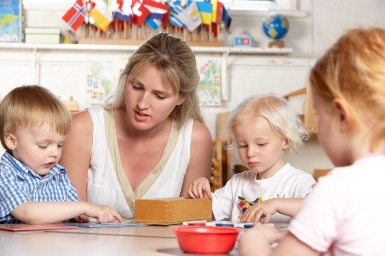 I’m frequently asked these kinds of questions: Do children really do well in Montessori? What kinds of traits does a Montessori child develop? Is Montessori really a better way to learn?
I’m frequently asked these kinds of questions: Do children really do well in Montessori? What kinds of traits does a Montessori child develop? Is Montessori really a better way to learn?
I decided to ask for input, and posted this question on Facebook: “Parents, can you share some positive results you’ve seen in your child from being in Montessori?”
The answers were amazing!
Within minutes, people were chiming in to share the myriad of ways that Montessori has impacted their children. Here’s a sampling of the responses:
“I was so impressed with the improvement of my then four-year-old son that I became a Montessori teacher myself! Montessori helps the child to focus, develop gross/fine motor skills, and teaches them to think for themselves. It changed my life.”
“Where to begin? Well, for starters, my oldest has consistently been at the top of her class since first grade. She has a sense of self-assurance and maturity that other children her age lack. She is a critical thinker and has a keen interest in the world around her.”
“Hello! I am from Mexico. I have gone to a Montessori preschool myself and my two sons did as well. I think the most important thing about Montessori is that it gives children a very strong sense of self. I found my children to be self motivated, independent, secure, and able to adapt to any situation, because they are open to learning.”
“My son has wonderful social skills and introduces himself to others and asks their names. Also, he has endless questions on everything and his curiosity seems boundless. Montessori has continued to feed this natural curiosity by giving him the tools to ask questions and keep asking.”
“My daughter just finished her first year of traditional 6th grade (middle school) after being in Montessori since she started school. Montessori taught her that learning is her responsibility. She knows how to research a subject on her own and how to work in groups. If she has difficulty she finds a new way to look at the subject so she understands it. Montessori taught her how to learn, not just memorize facts.”
The Characteristics of Montessori
As I looked over the replies, I found that many of these “characteristics of a Montessori child” were mentioned more than once and some many times:
- independent thinking/independence
- self-assured/self-confident
- mature
- critical thinker
- early reader/good reader/enjoys reading
- develops fine-motor skills
- self-motivated
- respectful of others
- knows how to learn/loves learning
- creative
In the Montessori training, teachers are taught to look for certain traits in their students as the result of Montessori; these are known as “characteristics of an authentic Montessori experience”. They are:
- independence
- confidence
- self-discipline
- intrinsic motivation
- ability to handle external authority
- academic achievement
- spiritual awareness [respect for others and for nature]
- responsible citizenship
A comparison of the two lists shows that the Montessori method does just what it says it will do!
Looking for Data
For many people, the observations of parents and teachers aren’t enough. They want hard data to prove that Montessori works.
There have been few studies done, sadly, tracking the outcomes of Montessori children in comparison to children in traditional education. One study in Milwaukee is often cited although some researchers feel the study size was too small. The study did find that Montessori students outscore traditional school children in math, language, and social skills.
Also helpful is research done in the scientific arena, especially that of Dr. Steve Hughes, a Montessori parent and pediatric neuropsychologist. Dr. Hughes has done extensive research on cognitive development, and he has concluded that the Montessori method is perfectly designed to fit the way our brains process information.
It’s clear that more research needs to be done, but so far, the conclusions mirror what we see happening every day in our homes and classrooms.
Seeing the Results
There are many ways to quantify the effects of the Montessori method, and they all have value. The scientific studies give validity to our observations, and our observations bring life to the scientific studies. Clearly, the Montessori method of education is something special. As one parent said, “If you want to give your child the best gift of his or her life, give them a Montessori education.”

